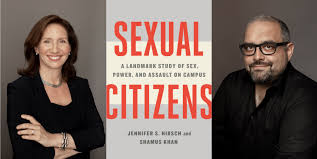
Courtesy of W.W. Norton
Jennifer S. Hirsch will visit Yale on Thursday to speak about the book she co-authored with fellow Columbia professor Shamus Khan: “Sexual Citizens: A Landmark Study of Sex, Power, and Assault on Campus.”
Hirsch will first speak at the Yale School of Public Health at noon and once more at the Yale Bookstore at 6 p.m. At this event, Hirsch will share detailed experiences of sex and sexual assault included in the book.
“Sexual Citizens” is a product of the five-year Columbia research study titled “Sexual Health Initiative to Foster Transformation (SHIFT).” This research study — aimed at understanding college campus assault and, thus, developing better prevention strategies — involved a plethora of work by professors of ranging disciplines, long interviews, field observations, a diary study, focus groups and a population-based survey.
Khan said that he and Hirsch argue “that we have to think of sexual assault relative to power — particularly power in sexuality.” He and Hirsch looked at college campus sexual assault through an intersectional lens, considering the racial, economic and sexual power inequalities involved.
According to Hirsch, public conversation surrounding sexual assault on college campuses too often focuses on adjudication of assaulters and the idea that the campus is a “hunting ground,” rather than approaching the issue as a public health concern.
Hirsch and Khan said they like to joke that their partnership arose from an “arranged marriage.” Hirsch originally had the idea of doing research aimed at better understanding the social context of sexual assault. When Columbia supported her idea, she reached out to a colleague of hers. Together they came up with SHIFT, which she described as having “moonshot-level” ambition. SHIFT had three prongs: ethnography, survey and community involvement. Hirsch’s colleague suggested Khan to assist with SHIFT’s ethnography component — thus, their “arranged marriage” began. Khan said the two scholars have complementary interests. Both have worked extensively in gender studies, though Hirsch focuses on sexuality and Khan focuses on young people in elite educational contexts.
Khan said that in their book, he and Hirsch are trying to understand these issues not in isolation but in the context of a student’s whole life. To do so, they conducted research about dorm rooms, fraternity spaces, athletic buses, dining halls and religious spaces. Their aim, said Khan, was to “pull back the curtain” on a modern collegiate experience and use their findings to explain why sexual assault is so common.
Claire M. Renzetti, who is a professor of sociology at the University of Kentucky, wrote in Science that “Sexual Citizens” approaches its subjects with “empathy and respect.” The research process and the book itself are centered on the students’ interpretations of their own narratives.
Ashley Fetters, who writes about relationships, dating, sex and marriage for The Atlantic, said she sees many relevant books come and go from her desk, yet “Sexual Citizens” prompted her to write an article called “Bad Hookup, or Sexual Assault? Sometimes the Friends Decide.” She said that she was moved to write about the book because Khan and Hirsch had “spent so much time talking to students about their sex lives.” Fetters found the nonjudgmental lens through which the researchers viewed students novel and compelling.
As someone who went to college in the early 2010s — during what she referred to as the height of the “hookup culture panic” — Fetters described being bombarded by articles denouncing this culture. Because of this, she is particularly sensitive to the way student hookup culture is portrayed. “Hirsch and Khan showed a lot of empathy for students in college that are in a difficult position and feeling vulnerable,” Fetters said.
Hirsch said that, in the past, conversation has focused on the perceived failures of college campuses, but this oversimplifies the narrative. According to Hirsch, citizens should instead ask what everyone can do differently — especially by preparing kids for sex in familial and educational contexts.
“In order to drive, there is a whole system in place so that young people can do what is a pretty dangerous behavior: moving a two-ton vehicle around the world without hurting other people,” Hirsch said. “There is a lack of a parallel social effort to prepare young people to have sex.” It is therefore not surprising, she added, that young people have sex in ways that are harmful or even just very unkind.
“No one is teaching them to do better,” Hirsch said.
Hirsch and Khan embarked on their sweeping book tour early this year. They will give two or three talks each week this spring in order to engage larger conversations about sexual assault and are making an effort not to limit themselves to elite Northeastern schools.
Hirsch will be speaking at Princeton next week, and will end on June 4 at the Campus Prevention Network Summit in Washington, D.C.
Annie Radillo | annie.radillo@yale.edu
Correction, Feb. 20: A previous version of this article spelled Shamus Khan’s last name incorrectly in several places.







